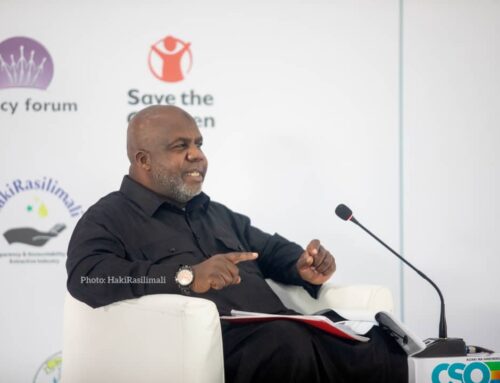Tax avoidance is one of the biggest economic issues of our time. According to International Monetary Fund (IMF), developing countries currently lose $ 100- $ 300 billion of tax revenue through tax avoidance. One among many reasons for such a problem is inefficient taxation of extractive activities and the inability to fight abuses of transfer pricing by multinational enterprises. This was said in Dar es Salaam in the last breakfast debate of Policy Forum (PF) slated for November 25, 2016.
The debate focused on the presentation titled The Implementation of Transfer Pricing Rules in the Extractive Industry in Tanzania: Highlights from 2015 Natural Resource Governance Institute (NRGI) study presented by Thomas Scurfield.
According to Scurfield, transfer pricing is the price of a transaction between two entities that are part of the same group of companies. For example, a South Africa-based company might sell mining equipment and machinery to its Ghana-based subsidiary. The price agreed is the “transfer price.” The process for setting it is referred to as “transfer pricing.” The difficulty in monitoring and taxing such transactions is that they do not take place on an open market.
A commercial transaction between two independent companies in a competitive market should reflect the best option for both companies; two affiliated companies are more likely to make transactions in the best interest of their global parent corporation.
Presenting the results of the qualitative study on the challenges to implementation of transfer pricing rules in the extractive sector done in Ghana, Tanzania, Guinea, Zambia, and Sierra Leone, Scurfield explained that 75 interviews with government officials, companies, civil societies (CSOs) and non-governmental organizations (NGOs) were conducted.
Statistics of the report shows that governments in Africa depend much on goods and services as its tax revenue source which accounted for 33% followed by corporate income tax with 30%. Personal income tax indicates 20% and 10% of tax revenue is collected from international trade. Tax revenue collection from other sources is only 7%.
The study found numerous weaknesses/challenges in transfer pricing enforcement in Tanzania extractive sector. The challenges were grouped in three categories as: Legal Framework, Administrative Arrangements and knowledge and skills.
Legal framework challenges
- Weak transfer pricing regulations
The presenter recommended Ministry of Finance to amend the transfer pricing regulations to state whether Organization for Economic Cooperation and Development (OECD) or UN guidance should be followed where inconsistencies arise regarding interpretation of the regulations.
- Hedging losses
The Ministry of Finance was recommended to introduce separate tax treatment of hedging to limit the risk that extractive companies engage in abusive hedging to offset income.
- Cost of debt is not subject to limitation
The Ministry of Finance was recommended to introduce a rule to limit deductibility as a function of company’s earnings.
Administrative Arrangements
- Poor coordination between Tanzania Petroleum Development Corporation (TPDC) and Tanzania Revenue Authority (TRA)
The government was recommended to improve cooperation between the extractive industry regulators and the TRA by establishing a formal inter-agency coordination mechanism to oversee tax and revenue collection.
- No integrated, automatically accessible database for all extractive industry information
The Ministry of Finance and Ministry of energy and Mineral Development were recommended to develop an online information-sharing platform where all information concerning exploration, development and production of mineral and petroleum resources is made automatically available to TRA.
Knowledge and Skills
- Limited industry expertise
The presenter emphasized that limited extractive industry expertise may be used as a reason to avoid investigating taxpayers. Scurfield recommended the government and international partners to ensure that TRA officials especially from International Tax Unit (ITU) receives specialized training on transfer pricing as it relates to the extractive sector, as well as further capacity building on taxation of extractive industries generally. This will equip the ITU with the expertise and confidence to conduct transfer pricing audits in the extractive industry.
Conclusively, the presenter explained that the government of Tanzania has made considerable progress towards establishing a robust transfer pricing regime. Since the introduction of transfer pricing regulations in 2014, the ITU has completed five transfer pricing audits amounting to TZS232 billion in tax adjustments. Consequently, the ITU is in high demand not just from the Large Tax payers Office (LTO) but the rest of the TRA to investigate transfer pricing issues in relation to a range of taxpayers.
The mining industry in Tanzania has failed to deliver on its promises to transform the economy and develop the country. This is largely due to generous tax incentives and weak governance structures, often reinforced by political corruption.
Discussing the presentation, Ted Frank Silkiluwasha a Principal Tax Investigation Officer from TRA gave experience on how multinational companies are conducting transfer pricing. He further explained that some policies in the country are limiting TRA to stretch its arms to collect essential tax revenue related information. For instance some of the contacts are confidential.
Some policies are also limiting the locals to benefit from international companies. For instance some companies are importing materials/goods from abroad instead of buying materials/goods from the country.
He insisted the CSOs to pressurize the government to change or improve the rules and policies since they give loopholes which multinational companies use to avoid tax and also conduct transfer pricing.






